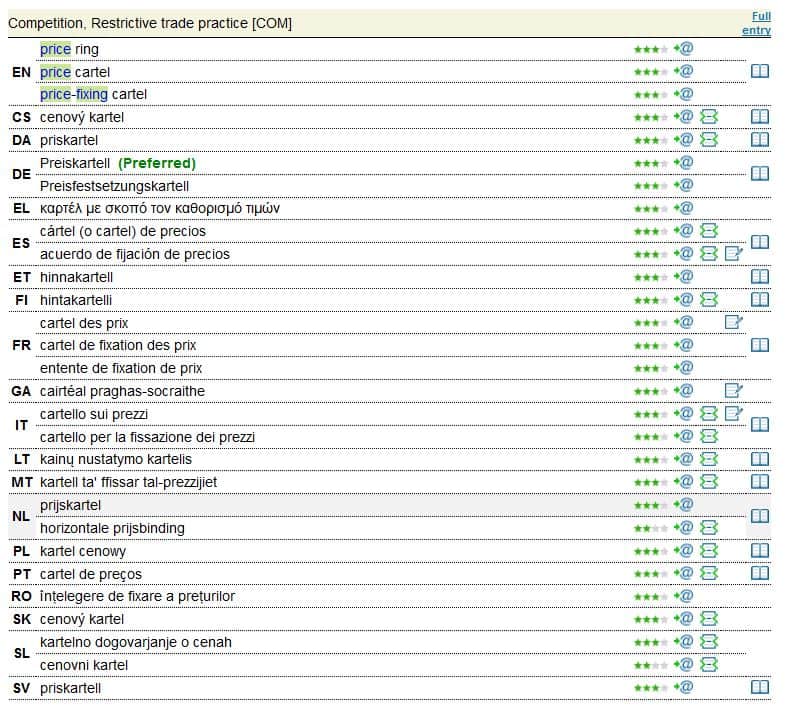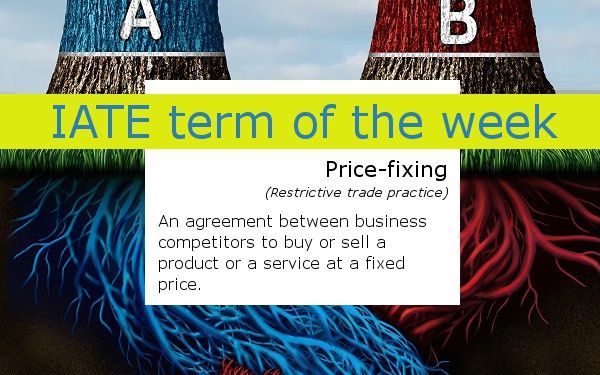
The record fines imposed by the European Commission inspired us in picking this week’s IATE term. The European Union’s antitrust chief imposed a 2.9 billion euro, or $3.2 billion, fine on a group of truck makers for price-fixing and imposing a system aimed at delaying the installation of pollution-curbing exhaust pipes and engines.
It is a record fine, but it is not the only one. Fines in the European Union for organizing cartels have risen in recent years. From 1990 to 1994, the Commission imposed fines on cartels totalling €540 million, while two decades later, from 2010 to 2014, totalling €8.7 billion.
This being the background, we have picked as the IATE term of this week price-fixing.
Price-fixing is an agreement (or a conspiracy) between actors in the same industry, that are supposed to be competitors, to buy or sell a product or a service at a fixed price, or to maintain the same price at a given level by controlling the supply and demand.
Price-fixing can happen in multiple ways. Businesses can agree to all set a high price so that consumers would have no choice but to buy at that high fixed price. This has also consequences in that industry, because any other businesses that are not part of the cartel are also forced to sell at the set price in order to survive.
Another form of price-fixing happens when businesses from the same field agree to hold discounts of goods or services at the same time.
It is also important to point out that price-fixing is illegal when two or more businesses have an agreement to fix that price. A single business, setting a specific price on its own does not fall under the price-fixing regulations. It is also possible that two businesses have the same price for the same service or good, but without having an agreement between them; it does not mean that they fixed that price.

It can happen in some fields such as agriculture where the prices of a commodity, let us say wheat for example, can be identical from multiple producers, because the products are identical. In addition, if natural causes occur, such as drought, that can influence the production and the price of that product can rise or fall and it doesn’t mean that the producers formed a cartel to fix the price.
Also, price-fixing doesn’t necessarily mean that the businesses set the price at a high level. They can agree to stabilize a price or even to decrease it.
I hope we have given you an idea about price-fixing, so please check in IATE for the equivalents in your language and introduce the ones that are missing:
[su_note note_color=”#dcea0f”][su_button url=”https://docs.google.com/forms/d/e/1FAIpQLSeRFhR6w7FsR0lX2cucAKuClgn8vVc_uHsMCqAQv4OL7dL4cg/viewform” style=”flat”]Contribute to IATE![/su_button] We would welcome your contribution if you know the correct term in your language and it is among the missing ones or if it needs an update. A terminologist for the respective language will revise your answer and validate it. Given the implications of the process, a delay is to be expected.
Languages to be completed for this term in IATE: BG, HR, HU, LV.[/su_note]
Sources:
- Price – fixing
- Federal Trade Commission definition of price-fixing
- Price-fixing truck makers get record EU fine
- What is price-fixing?

Written by Raluca Caranfil
Journalist & Communication Trainee at TermCoord
